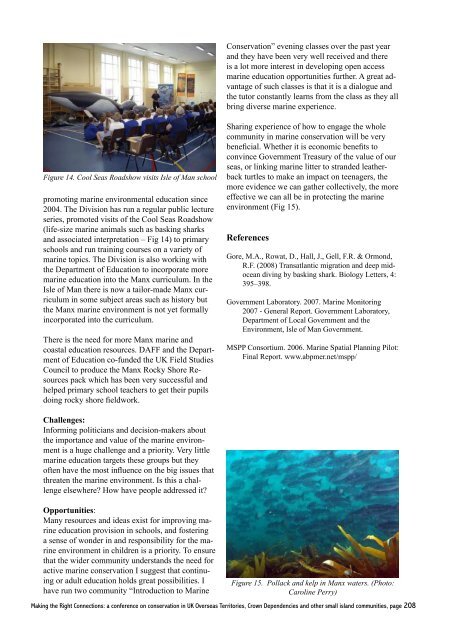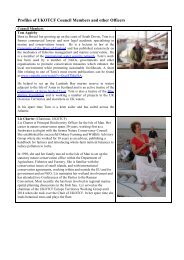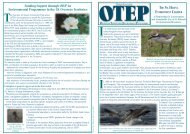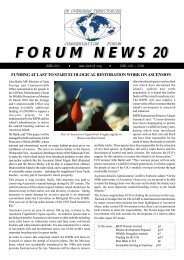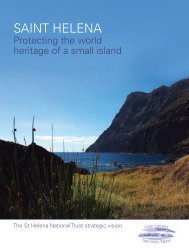Section 06 - UKOTCF
Section 06 - UKOTCF
Section 06 - UKOTCF
Create successful ePaper yourself
Turn your PDF publications into a flip-book with our unique Google optimized e-Paper software.
Conservation” evening classes over the past year<br />
and they have been very well received and there<br />
is a lot more interest in developing open access<br />
marine education opportunities further. A great advantage<br />
of such classes is that it is a dialogue and<br />
the tutor constantly learns from the class as they all<br />
bring diverse marine experience.<br />
Figure 14. Cool Seas Roadshow visits Isle of Man school<br />
promoting marine environmental education since<br />
2004. The Division has run a regular public lecture<br />
series, promoted visits of the Cool Seas Roadshow<br />
(life-size marine animals such as basking sharks<br />
and associated interpretation – Fig 14) to primary<br />
schools and run training courses on a variety of<br />
marine topics. The Division is also working with<br />
the Department of Education to incorporate more<br />
marine education into the Manx curriculum. In the<br />
Isle of Man there is now a tailor-made Manx curriculum<br />
in some subject areas such as history but<br />
the Manx marine environment is not yet formally<br />
incorporated into the curriculum.<br />
There is the need for more Manx marine and<br />
coastal education resources. DAFF and the Department<br />
of Education co-funded the UK Field Studies<br />
Council to produce the Manx Rocky Shore Resources<br />
pack which has been very successful and<br />
helped primary school teachers to get their pupils<br />
doing rocky shore fieldwork.<br />
Sharing experience of how to engage the whole<br />
community in marine conservation will be very<br />
beneficial. Whether it is economic benefits to<br />
convince Government Treasury of the value of our<br />
seas, or linking marine litter to stranded leatherback<br />
turtles to make an impact on teenagers, the<br />
more evidence we can gather collectively, the more<br />
effective we can all be in protecting the marine<br />
environment (Fig 15).<br />
References<br />
Gore, M.A., Rowat, D., Hall, J., Gell, F.R. & Ormond,<br />
R.F. (2008) Transatlantic migration and deep midocean<br />
diving by basking shark. Biology Letters, 4:<br />
395–398.<br />
Government Laboratory. 2007. Marine Monitoring<br />
2007 - General Report. Government Laboratory,<br />
Department of Local Government and the<br />
Environment, Isle of Man Government.<br />
MSPP Consortium. 20<strong>06</strong>. Marine Spatial Planning Pilot:<br />
Final Report. www.abpmer.net/mspp/<br />
Challenges:<br />
Informing politicians and decision-makers about<br />
the importance and value of the marine environment<br />
is a huge challenge and a priority. Very little<br />
marine education targets these groups but they<br />
often have the most influence on the big issues that<br />
threaten the marine environment. Is this a challenge<br />
elsewhere? How have people addressed it?<br />
Opportunities:<br />
Many resources and ideas exist for improving marine<br />
education provision in schools, and fostering<br />
a sense of wonder in and responsibility for the marine<br />
environment in children is a priority. To ensure<br />
that the wider community understands the need for<br />
active marine conservation I suggest that continuing<br />
or adult education holds great possibilities. I<br />
have run two community “Introduction to Marine<br />
Figure 15. Pollack and kelp in Manx waters. (Photo:<br />
Caroline Perry)<br />
Making the Right Connections: a conference on conservation in UK Overseas Territories, Crown Dependencies and other small island communities, page 208


